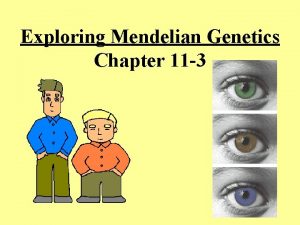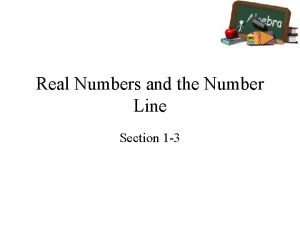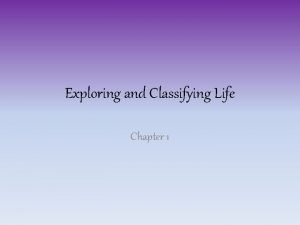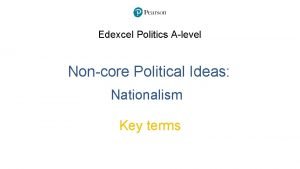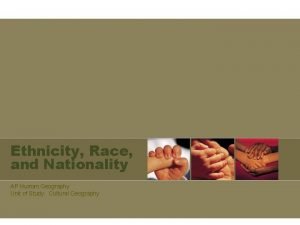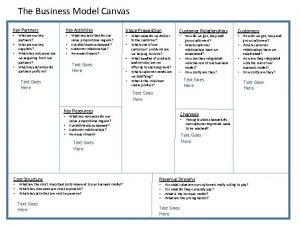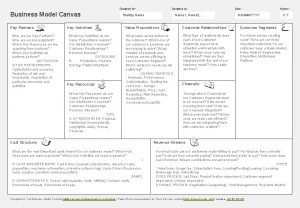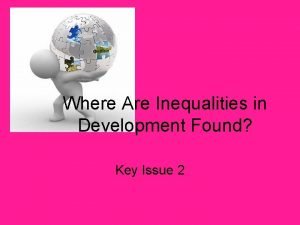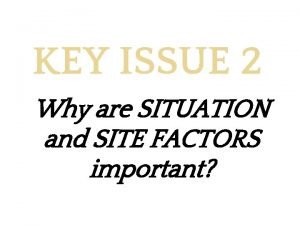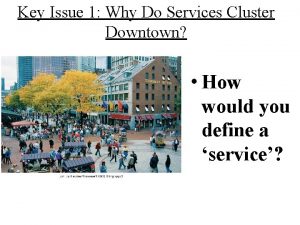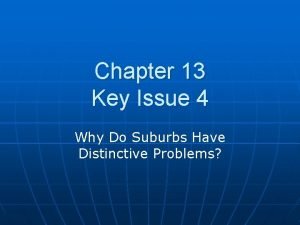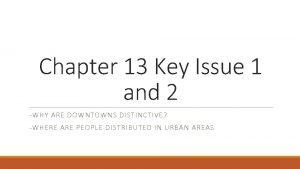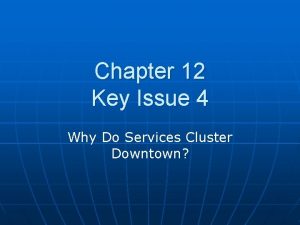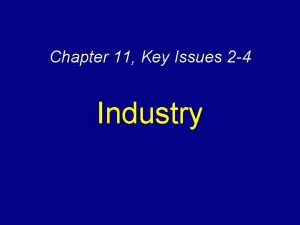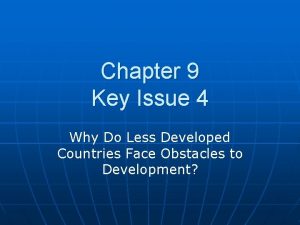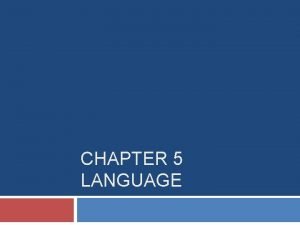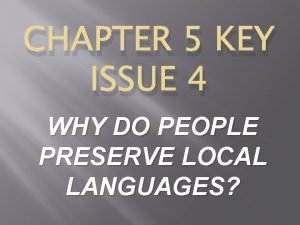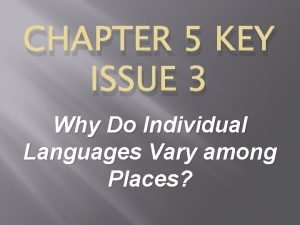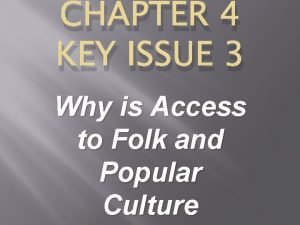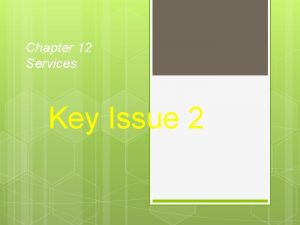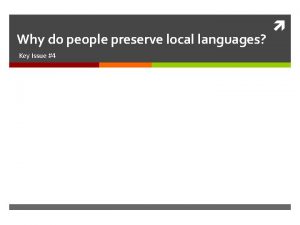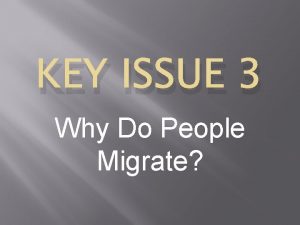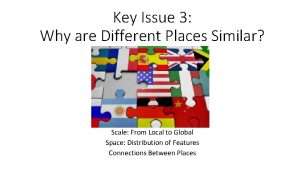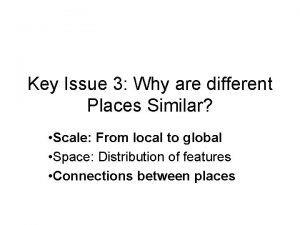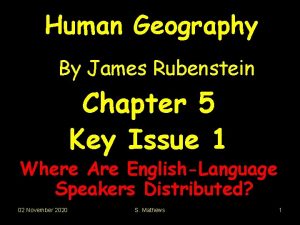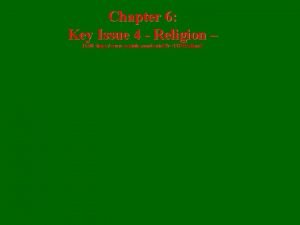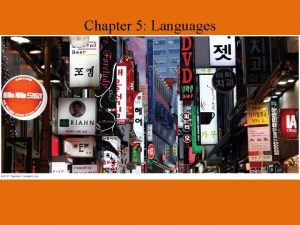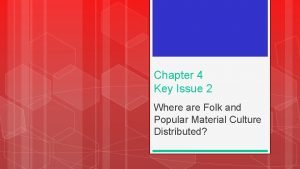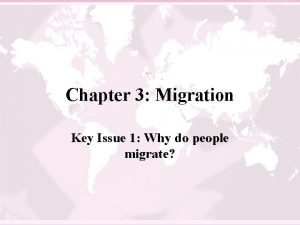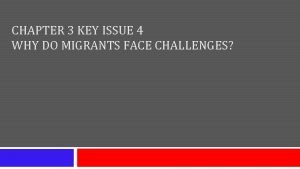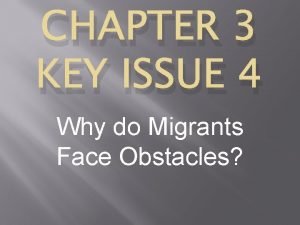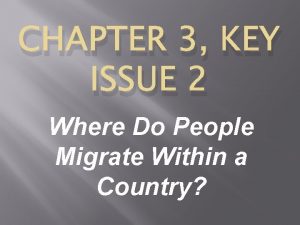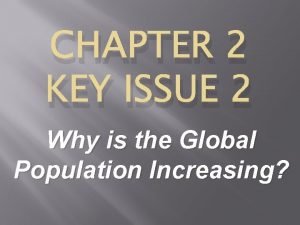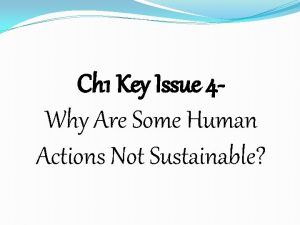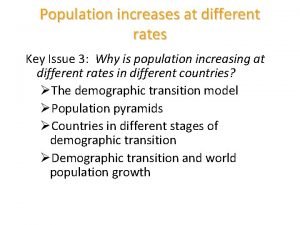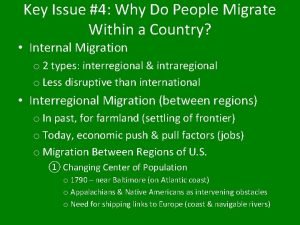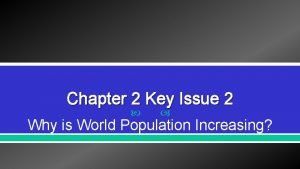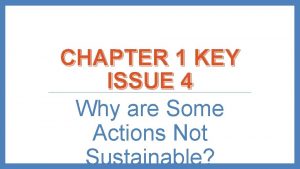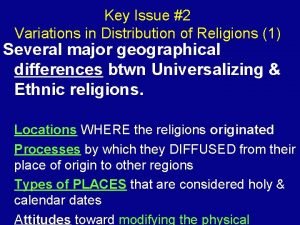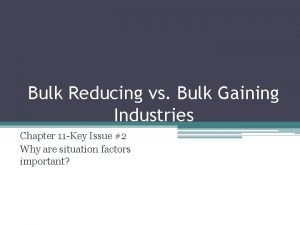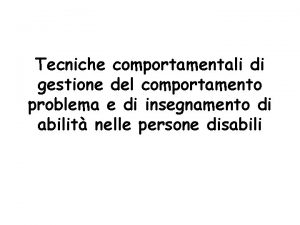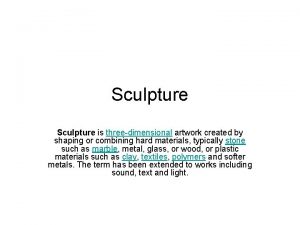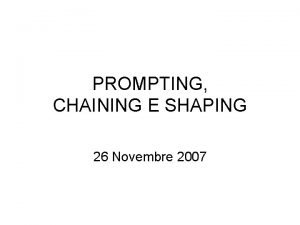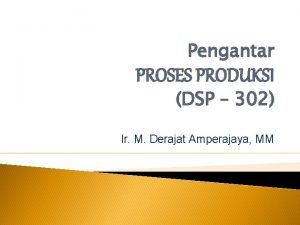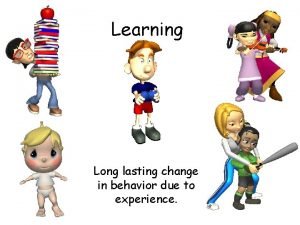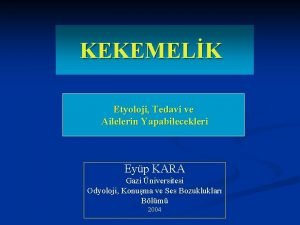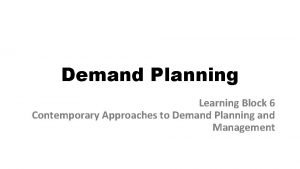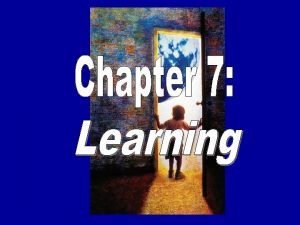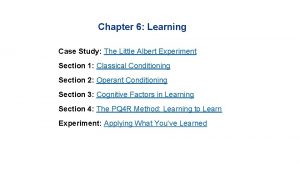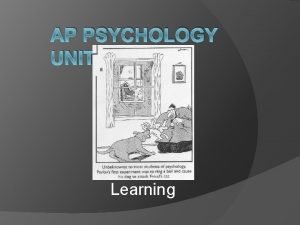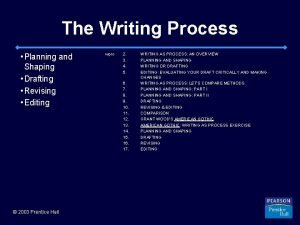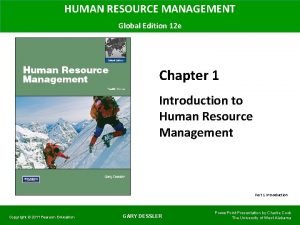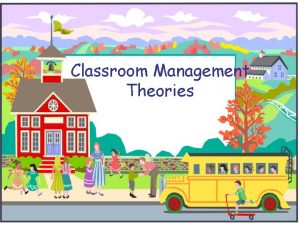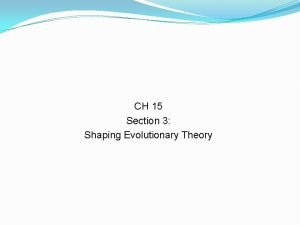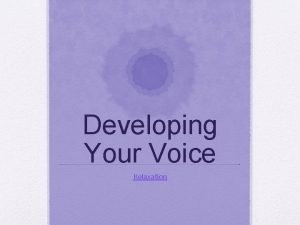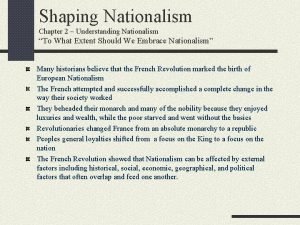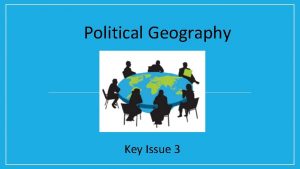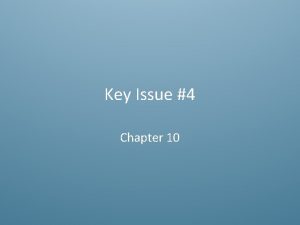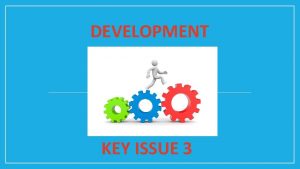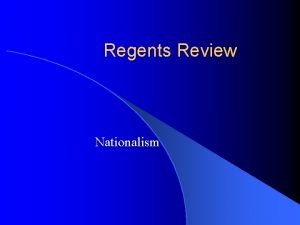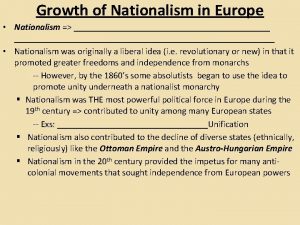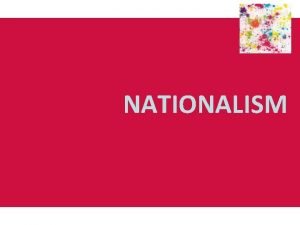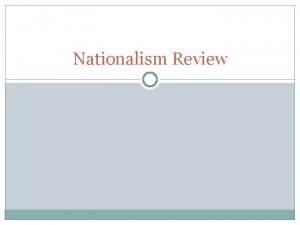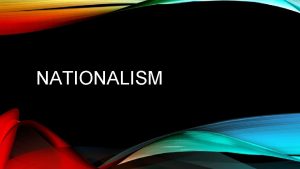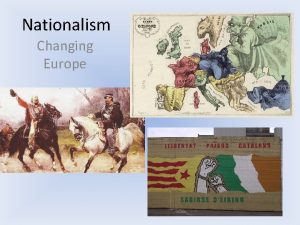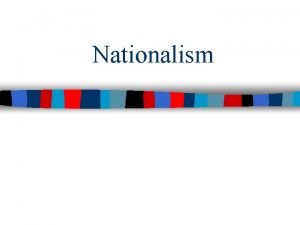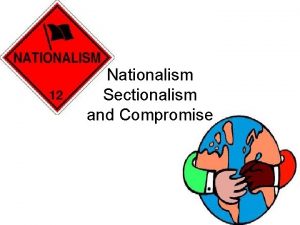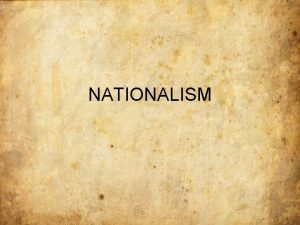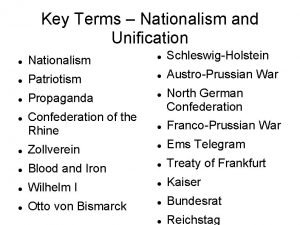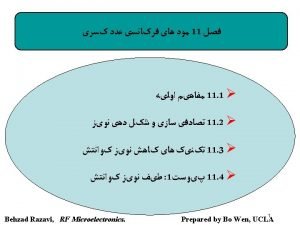Exploring Nationalism Shaping Nationalism Key Issue To what




























































































- Slides: 92

Exploring Nationalism Shaping Nationalism

Key Issue • To what extent should we embrace nationalism?

Related Issue 1 • To what extent should nation be the foundation of identity?



French Revolution, 1789 Liberty, equality, brotherhood

• What 3 words best capture the essence of Canada as a nation? • Could any events in Canada’s history be considered a revolution?

Canadian Symbol of Revolution


• Battle of the Plains of Abraham • War of 1812 • North West Rebellion • Winnipeg General Strike • October Crisis • Quiet Revolution

What are some factors that shape nationalism?

What are some factors that shape nationalism? • French revolution turning point of European Nationalism? • Changed the way French society worked; transformed France from an absolute monarch to a republic. • First European country to become a republic- instead of loyalty to a monarch, people began to focus their loyalty on the idea of themselvesthe people- as the nation.

The French Revolution: • Shows that nationalism can be shaped by external factors. • These external factors can be historical, social, economic, geographic and political.

The French Revolution: • Not caused by a single event. • But… a single event can capture a people’s collective imagination and inspire them to take action. • Storming of the Bastille, July 14, 1789 (600 people).

Symbol of Tyranny

Symbol of Tyranny • Successfully attacking and taking control of this symbol is usually considered to be the beginning of the French Revolution, and July 14 is now celebrated as a national holiday in France.

Terrorism/force shaping nationalism.

Bastille as a Nationalist Symbol • As news of the storming of the Bastille spread, it inspired other French people to take up arms against the king and the nobility.

Collective Consciousness • An internal consciousness, or awareness, shared by many. • Storming the Bastille entered the French collective consciousness as a defining moment in their history as a nation; it became a central part of their national myth because it said, “We are a nation. We can govern ourselves- in our own interests. ”

More than 200 years later… • The event continues to inspire people by reminding them that the actions of ordinary citizens can start a chain of events that lead to great change.


Truth about the Bastille?

The Bastille became less severe in the 18 th century, • It was little-used during the reign of Louis XVI and conditions improved. Former prisoners embellished their accounts of the Bastille with allegations of torture, underground dungeons, and a dismembering machine, but in fact many had significant privileges during their stays. The king paid a daily rate of ten livres per prisoner, enough to feed and supply them luxuriously—so much so that some drew on only half the daily rations and had the rest paid out when they were released.

The Bastille became less severe in the 18 th century, • During Voltaire’s second imprisonment in the Bastille, he received five or six visitors a day; he chose to stay a day longer than necessary to settle some business. Prisoners were permitted to bring in their own furniture (the Count de Belle-Isle did so in 1759), have bookcases built for their private library (La Beaumelle did so in 1753 to house over 600 books), and bring in servants (although finding help willing to be imprisoned posed a challenge).



Social Factors That Shaped French Nationalism • “Social Factors” refers to the relationship among people in a society and include: • Who should be considered important and who should not? • Who should lead and who should follow? • Who should be included and who should be excluded? • How groups should work out conflicts and respond to challenges.

Before the French Revolution • France was divided into strict social order that was defined mainly by birth. • Monarch and aristocrats (who also made up much of the high-ranking clergy in the Catholic Church) held most of the power.

Ruling Elite… 1789

Ruling Elite… 2016

Ruling Elite • Paid few taxes. • Owned all of the land. • Power enabled them to accumulate great wealth by collecting taxes, rent, and other fees from the common people.


France as the Centre of New Ideas • During the 1700 s, France was the cultural centre of Europe. • In Paris’ cafes, as well as salonsgatherings held in private homes and public buildings –writers, artists, philosophers, and others gathered to question the established order and to discuss ideas such as liberty, happiness, religious freedom and individual rights.

Intellectuals used mass media to spread their ideas…


Important? Hmmm…

A Growing Middle Class • Called the bourgeoisie. • Usually lived in towns/cities; became prosperous in business or by practicing a craft or profession. • Often well-travelled and well-educated; many had absorbed new ideas about individual rights. • Voltaire’s father, for example, was an educated man whose work as a public official made him a member of the bourgeoisie.

Bourseoisie • Most were aware that the power of the monarch in Britain had been limited by a parliament & that in Britain’s American colonies, a revolutionary war had led the creation of an independent republic, the United States, in 1783. • The were also aware of scientific discoveries that challenged old beliefs about the way the world worked.

Economic Factors That Shaped French Nationalism • War- during the 18 th century, France was almost constantly at war (Britain/other European countries/included some support for rebels in the American War of Independence)- costly and mostly ineffective. • Economy in chaos by the late 1780 s- decades of war drained the treasury and country was nearly bankrupt.


Louis XVI’s solution to money problems?

Desperate, XVI called a meeting of Estates General- first time in 170 years that they’d gathered.

Estates General • Made up of elected representatives of three separate estates, or social groups.


Estates General, June 1789 • Louis’ plan backfired; Third Estate was determined to change the system and create a constitution that set out equal rights for all men (white men that is ) • Declared themselves the National Assembly. • Swore the Tennis Court Oath, saying that they were the only group who represented the nation.

Page 51 • Cahiers de doleances – list of grievances. • With a buddy, read the examples of cahiers describing people’s concerns and complete Explorations 1 & 2.

Geographic Factors That Shaped French Nationalism

Geographic Factors That Shaped French Nationalism • At the same time Louis XVI wanted to raise taxes, large parts of France were suffering severe weather. • 1788 -1789 was bitterly cold, piles of snow blocking roads and making trade impossible. Melting snow then caused floods. • Spring and summer of 1789, large parts of the country were hit by drought.

Riots • Happened due to grain shortage; hungry people attacked wagons carrying grain to markets and seized grain supplies. • Famine feeds rumours- one of them suggested that aristocrats were preparing to attach people who were poor.

Let them eat cake.

Political Factors That Shaped French Nationalism

Declaration of the Rights of Man and of the Citizen

Women’s Petition to the National Assembly • Presented in October 1789; proposed a decree giving women equal civil and political rights. Pointed out that women were fully punishable, yet denied equal rights, “Women have the right to mount the scaffold, they must also have the right to mount the speaker’s rostrum. ” • Declaration also did not revoke slavery.

Nicolas de Condorcet and Etta Palm d’Aelders • "he who votes against the right of another, whatever the religion, color, or sex of that other, has henceforth abjured his own”. • *solemnly renounced

Declaration of the Rights of Man and of the Citizen • Eventually led to the creation of a French nation based on new principles- it established France as a secular-non religious- republic. • The 17 articles of the declaration became the basis of the French constitution.

Reaction outside France • Ruling elites in other countries watched with fear- some sent forces to invade France in an attempt to restore the power of the monarchy. • Do you think these actions would have weakened or strengthened French nationalism? Why?

Revolutionaries successfully fought these invasions… • In response to outside threats and to ensure that the gains made during the revolution would not be lost, they executed Loius XVI and Marie Antoinette in 1793.


Revolution Becomes Extreme • Revolutionary leaders began a crackdown that became known as the Reign of Terror. • 11 months in 1793 and 1794 • 200 000 arrested and 17 000 sentenced to death.

Maximilien Robespierre


Napoleon saw Military Conquests… • As a mission to extend revolutionary principles that had taken root in France all over Europe. • “I fought the decrepit monarchies of the old regime because the alternative was the destruction of everything I and the revolution had achieved in France. ”

Many French • Saw Napoleon as a national hero. • Many British and others who fought, and eventually defeated the French general, saw him as a power hungry dictator who caused great suffering. • How would these differing views have been shaped by the sense of nation and people involved?




Nationalism and Remembering

A Nation’s Myths • It’s history- are told by the dominant cultural group.

Immigrants and Racism

Citizenship and French Nationalism • In recent years, France has passed strict laws about who can and who cannot become a citizen. • 2004 - law passed which forbids the wearing of “conspicuous” religious apparel in state schools. Banned items include Jewish yarmulkes, Sikh turbans, large Christian crosses, and Muslim headscarves.


Story and Nationalism in the USA “No taxation without representation. ”

The Boston Tea Party • 1773 “tea tax”- very popular drink, so thought they’d pay it rather than go without. • Disguised as American Indians, dumped the tea in the harbour- very expensive & cost the British merchants a lot of money. British shut down the harbour so no ship could come or go. • Spark that started the American Revolution. Supports vision of themselves as a freedom-loving people who will not tolerate tyranny.

Canadian National Myth?

John A. Macdonald – A national dream that would unite the county.

6000 Chinese labourers. • Earned less than half the wages of the other workers. • Recruited to work in the most treacherous stretch- avalanches, rock slides, and cave-ins were everyday hazards. • In the first year alone, over 200 died of injuries and disease, such a scurvy.

Defining Canada’s Stories • For a long time, people of British heritage formed the dominant cultural group in Canada. • “To admit Orientals in large numbers would mean the end, the extinction of the white people. . . And we always have in mind the necessity of keeping this a white man’s country. ” Sir Richard Mc. Bride, Conservative premier of BC, 1914.




Challenging Canadian Myths • Whose perspective is ignored when words like “discovering” and “wilderness” are used when talking about Canada’s history?


Callihoo Road?

Page 60


First Nations and Metis Nationalism • Duncan Campbell Scott, Department of Indian Affairs: Viewed Aboriginal peoples as a “problem” that would be solved only by complete assimilation. “I want to get rid of the Indian problem… Our objective is to continue until there is not a single Indian in Canada that has not been absorbed into the body politic, and there is no Indian Department. ”


Cindy Blackstock, executive director of the First Nations Child and Family Caring Society of Canada

Dr. Peter Bryce


The Unjust Society • Pierre Trudeau/John Chretien- “White Paper” – Controversial proposal to end the federal government’s treaty obligations. • Once again the goal was to assimilate Aboriginal peoples.

Assimilate • Official government policy • Make part of/the same • Adopt the customs, traditions, language, religion, etc. of the dominant group.
 Section 3 shaping evolutionary theory
Section 3 shaping evolutionary theory Section 11-5 linkage and gene maps answer key
Section 11-5 linkage and gene maps answer key Exploring the water cycle
Exploring the water cycle Classifying and exploring life lesson 1 answer key
Classifying and exploring life lesson 1 answer key Section 11-3 exploring mendelian genetics
Section 11-3 exploring mendelian genetics Exploring the water cycle capture sheet answer key
Exploring the water cycle capture sheet answer key Chapter 2 exploring the americas answer key
Chapter 2 exploring the americas answer key Numbers natural numbers
Numbers natural numbers Lesson 5 exploring angles
Lesson 5 exploring angles Exploring angle pairs answer key
Exploring angle pairs answer key Classifying and exploring life lesson 2 answers
Classifying and exploring life lesson 2 answers Nationalism key thinkers
Nationalism key thinkers Race definition ap human geography
Race definition ap human geography Key partners business model canvas
Key partners business model canvas Key partners
Key partners Where are inequalities in development found
Where are inequalities in development found Why are situation and site factors important
Why are situation and site factors important Why do services cluster downtown
Why do services cluster downtown Chapter 13 key issue 3
Chapter 13 key issue 3 Chapter 13 key issue 1
Chapter 13 key issue 1 Chapter 12 key issue 1
Chapter 12 key issue 1 Chapter 12 key issue 4
Chapter 12 key issue 4 Chapter 11 key issue 4
Chapter 11 key issue 4 Key issue 1 where did agriculture originate
Key issue 1 where did agriculture originate Chapter 9 key issue 4
Chapter 9 key issue 4 Language
Language Chapter 5 key issue 4
Chapter 5 key issue 4 Key issue 3: why do individual languages vary among places?
Key issue 3: why do individual languages vary among places? Chapter 4 key issue 3
Chapter 4 key issue 3 Chapter 13 key issue 4
Chapter 13 key issue 4 Chapter 12 key issue 2
Chapter 12 key issue 2 Languages
Languages Key issue 3 why do people migrate
Key issue 3 why do people migrate Why are different places similar
Why are different places similar Why are different places similar
Why are different places similar Received pronunciation definition ap human geography
Received pronunciation definition ap human geography Chapter 6 key issue 4
Chapter 6 key issue 4 Key issue 1 where are languages distributed
Key issue 1 where are languages distributed Chapter 5 key issue 2
Chapter 5 key issue 2 Chapter 4 key issue 2
Chapter 4 key issue 2 Chapter 3 key issue 1
Chapter 3 key issue 1 Key issue 4 why do migrants face obstacles
Key issue 4 why do migrants face obstacles Key issue 4: why do migrants face obstacles?
Key issue 4: why do migrants face obstacles? Key issue 2: where do people migrate within a country?
Key issue 2: where do people migrate within a country? Chapter 2 population and health key issue 3
Chapter 2 population and health key issue 3 Chapter 2 key issue 2
Chapter 2 key issue 2 Thinking geographically key issue 1
Thinking geographically key issue 1 Key issue 4 why are some actions not sustainable
Key issue 4 why are some actions not sustainable Key issue 3 why does population growth vary among regions
Key issue 3 why does population growth vary among regions Key issue 4
Key issue 4 Chapter 2 key issue 1
Chapter 2 key issue 1 Key issue 4 why are some actions not sustainable
Key issue 4 why are some actions not sustainable Islam hearth
Islam hearth Bulk-reducing industry example
Bulk-reducing industry example Differenza tra shaping e chaining
Differenza tra shaping e chaining What is shapping
What is shapping Shaping processes for plastics
Shaping processes for plastics Shaping 2030
Shaping 2030 A process in sculpture putting additional parts
A process in sculpture putting additional parts Shaping significato
Shaping significato Teri christensen
Teri christensen Particulate processing adalah
Particulate processing adalah Palo alto traffic shaping
Palo alto traffic shaping Fixed interval schedule
Fixed interval schedule Edward thorndike puzzle box
Edward thorndike puzzle box Classical and operant condition
Classical and operant condition Shaping in operant conditioning
Shaping in operant conditioning Fluency shaping tekniği
Fluency shaping tekniği Shaping psychology
Shaping psychology Demand sensing and shaping
Demand sensing and shaping Shaping psychology definition
Shaping psychology definition Primary vs secondary reinforcers
Primary vs secondary reinforcers Shaping aba cooper
Shaping aba cooper How companies react to the marketing environment
How companies react to the marketing environment Fluency goals asha
Fluency goals asha Latent learning
Latent learning Writing brainstorming planning drafting and editing
Writing brainstorming planning drafting and editing The most dramatic force shaping our destiny is:
The most dramatic force shaping our destiny is: Shaping a world of trust
Shaping a world of trust Gear manufacturing process doc
Gear manufacturing process doc The shaping of a texts meaning by another text
The shaping of a texts meaning by another text Human resource management global edition
Human resource management global edition Con 100 shaping smart business arrangements
Con 100 shaping smart business arrangements Kounin glasser jones
Kounin glasser jones Chapter 15 section 3 shaping evolutionary theory
Chapter 15 section 3 shaping evolutionary theory Actors in the microenvironment
Actors in the microenvironment Noise shaping
Noise shaping The most dramatic force shaping our destiny is:
The most dramatic force shaping our destiny is: Full-stem curl
Full-stem curl The shaping and molding of sounds into syllables
The shaping and molding of sounds into syllables Loc body shaping gel
Loc body shaping gel The most dramatic force shaping our destiny is:
The most dramatic force shaping our destiny is: Shaping tomorrow with you
Shaping tomorrow with you




